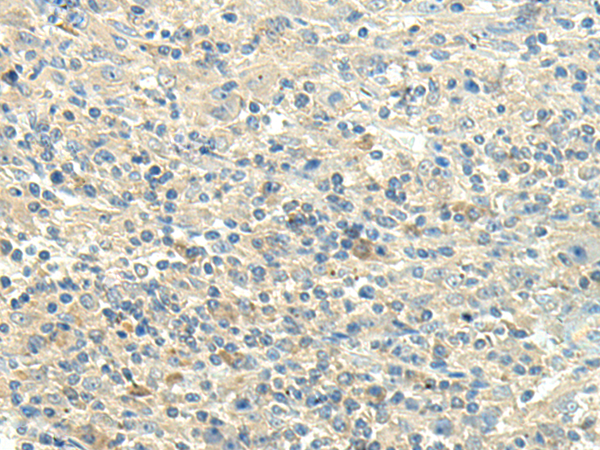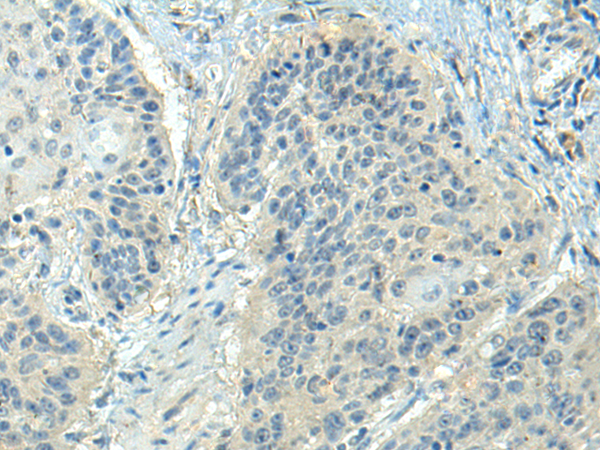

| WB | 咨询技术 | Human,Mouse,Rat |
| IF | 咨询技术 | Human,Mouse,Rat |
| IHC | 1/25-1/100 | Human,Mouse,Rat |
| ICC | 技术咨询 | Human,Mouse,Rat |
| FCM | 咨询技术 | Human,Mouse,Rat |
| Elisa | 1/5000-1/10000 | Human,Mouse,Rat |
| Aliases | EVEC; UP50; ADCL2; ARMD3; DANCE; ARCL1A; FIBL-5; HNARMD |
| Host/Isotype | Rabbit IgG |
| Antibody Type | Primary antibody |
| Storage | Store at 4°C short term. Aliquot and store at -20°C long term. Avoid freeze/thaw cycles. |
| Species Reactivity | Human, Mouse, Rat |
| Immunogen | Synthetic peptide of human FBLN5 |
| Formulation | Purified antibody in PBS with 0.05% sodium azide and 50% glycerol. |
+ +
1. **"Fibulin-5 is an elastin-binding protein essential for elastic fibre development in vivo"**
- **Authors**: T. Nakamura et al.
- **摘要**: 研究通过生成FBLN5特异性抗体,验证其在调控弹性纤维组装中的关键作用,并发现其缺失导致皮肤和血管弹性异常。
2. **"Fibulin-5 suppresses prostate cancer metastasis by inhibiting epithelial-mesenchymal transition"**
- **Authors**: M. Hirai et al.
- **摘要**: 利用抗FBLN5抗体进行免疫组化分析,揭示其在抑制肿瘤转移中的作用,并证明其通过调控EMT通路降低癌细胞侵袭性。
3. **"Fibulin-5 interacts with integrins to mediate endothelial cell adhesion and spreading"**
- **Authors**: H. Yanagisawa et al.
- **摘要**: 通过抗体阻断实验,证实FBLN5通过结合整合素调控内皮细胞黏附,影响血管发育和修复过程。
4. **"Loss of fibulin-5 promotes aortic aneurysms via altered TGF-β signaling"**
- **Authors**: A.R. Albig et al.
- **摘要**: 使用FBLN5抗体检测其在动脉组织中的表达,发现其缺失导致TGF-β信号失调,进而诱发动脉瘤形成。
The fibulin-5 protein (FBLN5), encoded by the *FBLN5* gene, is an extracellular matrix (ECM) glycoprotein critical for elastic fiber assembly and tissue integrity. It interacts with integrin receptors and ECM components like tropoelastin, facilitating cell adhesion, migration, and tissue remodeling. FBLN5 antibodies are essential tools for studying its roles in development, wound healing, and diseases.
Research applications include detecting FBLN5 expression via Western blot, immunohistochemistry (IHC), or immunofluorescence (IF) to explore its involvement in pathologies such as age-related macular degeneration, cardiovascular disorders, and cutaneous conditions like cutis laxa. Dysregulated FBLN5 is also linked to cancer progression, where it may act as a tumor suppressor or promoter depending on context, influencing metastasis and angiogenesis.
Commercial FBLN5 antibodies are typically monoclonal or polyclonal, raised against specific epitopes (e.g., human FBLN5 C-terminal regions). Validation ensures specificity in recognizing target isoforms across species. Studies using these antibodies have revealed FBLN5’s dual roles: maintaining elastin homeostasis in healthy tissues versus promoting inflammatory or fibrotic signaling when dysregulated. However, conflicting findings in cancer research highlight context-dependent functions, necessitating further investigation. Overall, FBLN5 antibodies remain vital for elucidating ECM biology and therapeutic targeting.
×